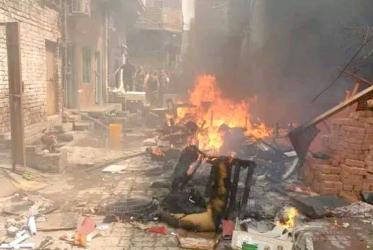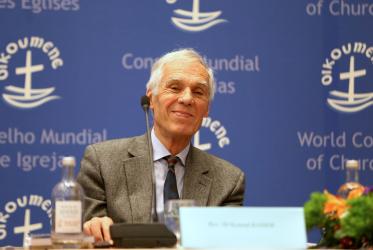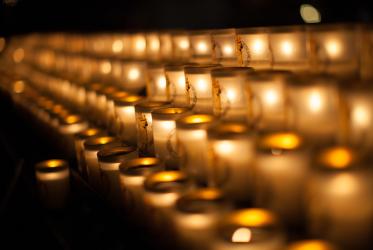Letter to member churches in Argentina, 10 January 2002.
Queridos hermanas y hermanos:
¡Cuánto sentido tiene en estas horas el saludo que el Apóstol Pablo dirigía a las iglesias: "Permanezcan con ustedes la gracia y la paz"! (1 Ts 1: 1)
En las últimas semanas, diversas informaciones han mostrado el doloroso proceso que ha vivido y continúa viviendo vuestro país, Argentina. Los medios masivos de comunicación han mostrado una y otra vez los violentos enfrentamientos entre ciudadanos y fuerzas policiales, los saqueos a comercios, las manifestaciones frente al Congreso y la Casa Rosada. Nos consterna el saldo de decenas de hombres y mujeres muertos, principalmente jóvenes, y varios miles de personas detenidas. Asimismo hemos recibido noticias del trabajo y la oración que cristianos e iglesias en Argentina han llevado adelante en este tiempo.
Junto a las iglesias y al movimiento ecuménico en todo el mundo, hemos sufrido con ustedes, y junto a ustedes hemos intentado oír el clamor del pueblo y discernir la presencia del Espíritu en medio de la situación que están viviendo. Situación marcada por mucha confusión, ira y violencia, pero también por signos de solidaridad, y de preocupación genuina de parte del pueblo argentino por su futuro. Desde un primer momento, hemos estado orando para que se restituya y fortalezca la institucionalidad democrática en ese querido país. Damos gracias a Dios por el testimonio que cristianos e iglesias en Argentina han dado en momentos tan difíciles y le rogamos que los confirme en la fe, la esperanza y el amor solidario.
Indudablemente, como lo han señalado numerosos analistas y las mismas iglesias y organismos ecuménicos, la magnitud de la crisis que atraviesa Argentina es muy preocupante. Tal vez lo más llamativo ha sido la renuncia consecutiva de dos presidentes de la nación en unos pocos días. Pero lo más preocupante es la situación de pobreza e inseguridad en que viven millones de personas en Argentina, debido en gran medida a la política económica de los últimos años. No nos toca a nosotros analizar ahora las causas de esta crisis, que ustedes conocen con detalle. Sólo quisiéramos decir que esta situación nos desafía a continuar profundizando nuestra reflexión ética y espiritual sobre el rol y el comportamiento de los dirigentes políticos locales, de los organismos financieros internacionales y de los diversos sectores de la sociedad. Es también un momento para continuar profundizando sobre nuestra acción comprometida con la vida, la justicia y la solidaridad.
Conmueven el clamor del pueblo argentino y las respuestas que las iglesias, organismos ecuménicos y otros actores de la sociedad civil están dando a lo que es también una crisis ética y espiritual. En el marco del Decenio para Superar la Violencia, que se inauguró a comienzos del 2001, alentamos a los cristianos, a las iglesias, a otras confesiones religiosas, a todos los hombres y todas las mujeres comprometidos con la paz, a aunar esfuerzos para superar esta crisis y construir una Argentina más justa y fraterna, fortaleciendo los lazos con la región. Será imprescindible, como han señalado iglesias y otros actores sociales, apelar a la responsabilidad de la clase política, superar la corrupción, la impunidad, el abuso de poder y dar pasos concretos e inmediatos hacia una verdadera reconciliación nacional basada en la justicia. En la presente situación, esto sólo se consigue con un afianzamiento de la democracia, y el respeto y la defensa de los Derechos Humanos, expresión del cuidado de la vida que el Dios Creador ha puesto en nuestras manos.
Recientemente escribía en el Mensaje de Navidad de 2001 que "nuestro mundo no podrá ser redimido sino por gracia y misericordia. Dios da y perdona con generosidad y ofrece vida en abundancia (Juan 10: 10) sobre todo para quienes son perdedores en nuestro mundo sin misericordia". Esta lógica de la misericordia es extraña para la lógica del poder, de la violencia, del mercado, que rige muchas veces nuestro mundo. Y sin embargo, desde la perspectiva cristiana, entrar en la misericordia de Dios es condición sine qua non para obtener la justificación.
Junto a cristianos de todo el mundo, me uno a ustedes para que se sientan reconfortados en la fe y hago mías las palabras del salmista, conocedor de la angustia, la miseria y la violencia: "Desde el abismo clamo a ti, Señor, escucha mi clamor
mi alma aguarda al Señor, mucho más que el centinela a la aurora
porque el Señor tiene misericordia y hay en él abundante redención" (Salmo 130).
En Cristo,
Rvdo Dr. Konrad Raiser
Secretario General
[TRANSLATION]
Dear Sisters and Brothers,
"Grace to you and peace" (1 Thess.1:1) - the apostle Paul's words of greeting to the churches seem specially significant at this time.
Many reports in recent weeks have drawn attention to the distressing situation afflicting your country, Argentina. Time and again the mass media have shown pictures of violent clashes between the population and the police, looting of shops, demonstrations outside Congress and the Casa Rosada. We deeply deplore the deaths of dozens of men and women, many of them young, and the thousands of arrests that have been made. At the same time, we have also heard about the work being done by the churches and Christians of Argentina and their prayers for the situation.
Together with churches and the world-wide ecumenical movement we have shared in your suffering and we have been with you as you try to hear the cry of the people and discern the presence of the Spirit in the midst of this crisis. It is a situation marked by great confusion, anger and violence but also by signs of solidarity and genuine concern for the future on the part of the Argentinian people. From the very beginning we have been praying that the democratic institutions of your beloved country may be restored and strengthened. We give thanks to God for the witness borne by Christians and churches in Argentina at this difficult time and we ask God to strengthen them in faith, hope and love.
As many analysts, and indeed churches and ecumenical organizations themselves, have pointed out, the scale of the crisis in Argentina is alarming. Perhaps the most striking thing has been the resignation of two presidents within the space of a few days. But most worrying of all is the state of poverty and insecurity in which millions of people in Argentina find themselves living today, largely as a result of the economic policy of recent years. It is not for us to analyse the causes of this crisis, which you know only too well. Let us simply say that the situation challenges us to continue our ethical and spiritual reflection on the role and behaviour of political leaders, international financial institutions and the different sectors of society. It also gives us cause to reflect further on our own commitment to action for life, justice and solidarity.
We are moved by the cry of the Argentinian people and the way in which the churches, ecumenical organizations and other members of civil society are responding to this crisis, which is to some extent also ethical and spiritual. In the context of the Decade to Overcome Violence, launched at the beginning of 2001, we urge Christians, churches, people of other faiths and all men and women committed to peace to join forces to overcome this crisis and build a society of greater justice and solidarity in Argentina, strengthening ties with other countries in the region. As churches and other social groups have said, politicians must be called upon to act responsibly, to put an end to corruption, impunity and abuse of power and to take immediate steps that will lead to genuine national reconciliation based on justice. In the present situation this can only be done by strengthening democracy and ensuring respect and protection of human rights, as a mark of our concern for the life which God the Creator has entrusted to our care.
In the WCC's Christmas message for 2001, I recently wrote that our world will only be saved by grace and mercy. "God gives and forgives generously and offers life in fullness ( John 10:10) especially to those who are losers in our merciless world". The logic of mercy is foreign to the logic of power, violence, market forces which often governs our world. Yet, from the Christian point of view, participating in God's mercy is the condition sine qua non for obtaining justification.
With Christians all over the world I pray that you may be comforted in the faith and recall the words of the Psalmist, who was acquainted with grief, suffering and violence: "Out of the depths I cry to you, oh Lord. Lord, hear my voice! ... my soul waits for the Lord more than those who watch for the morning... for with the Lord there is steadfast love" (Psalm 130).
Yours in Christ,
Konrad Raiser
General Secretary



